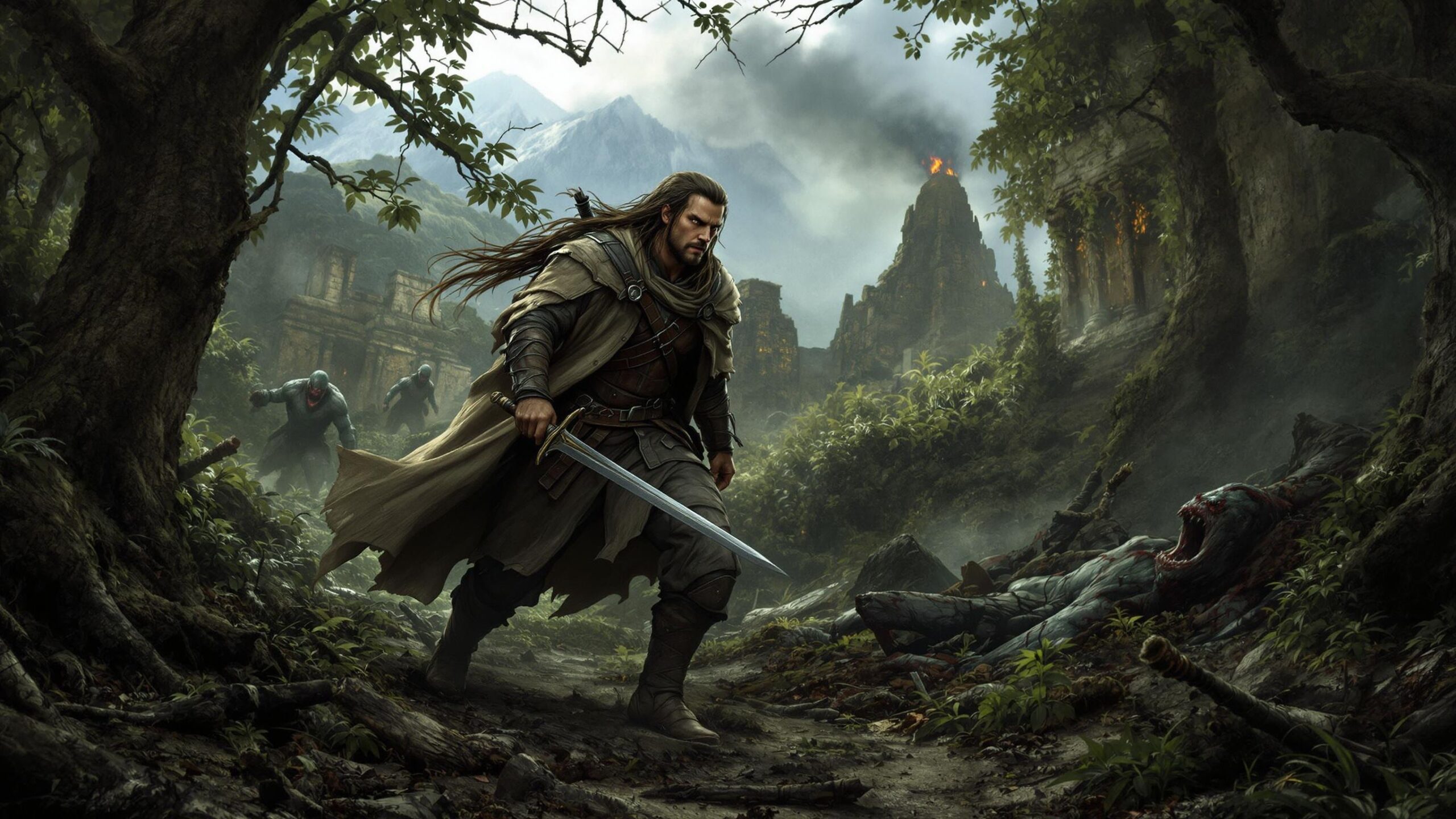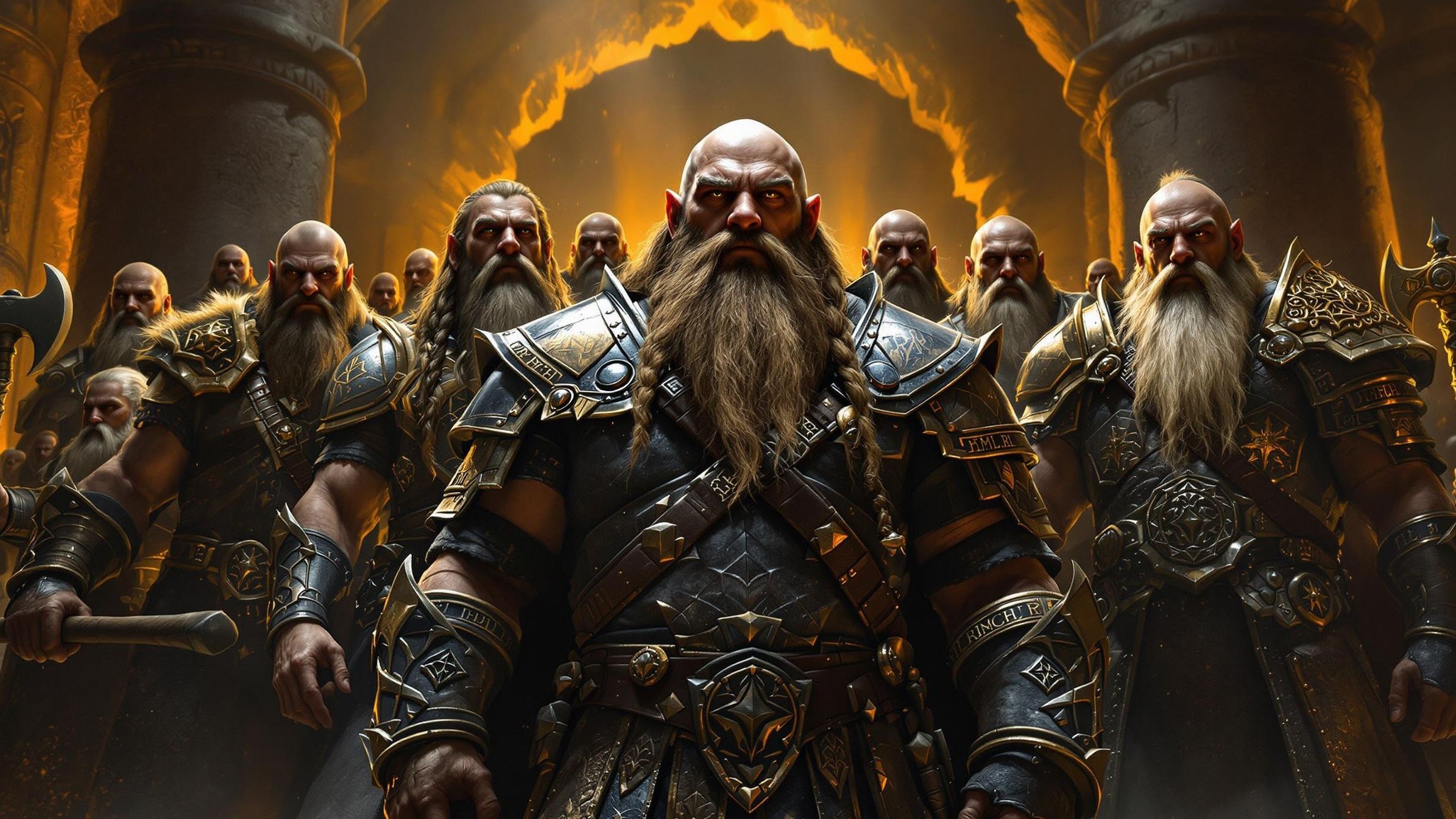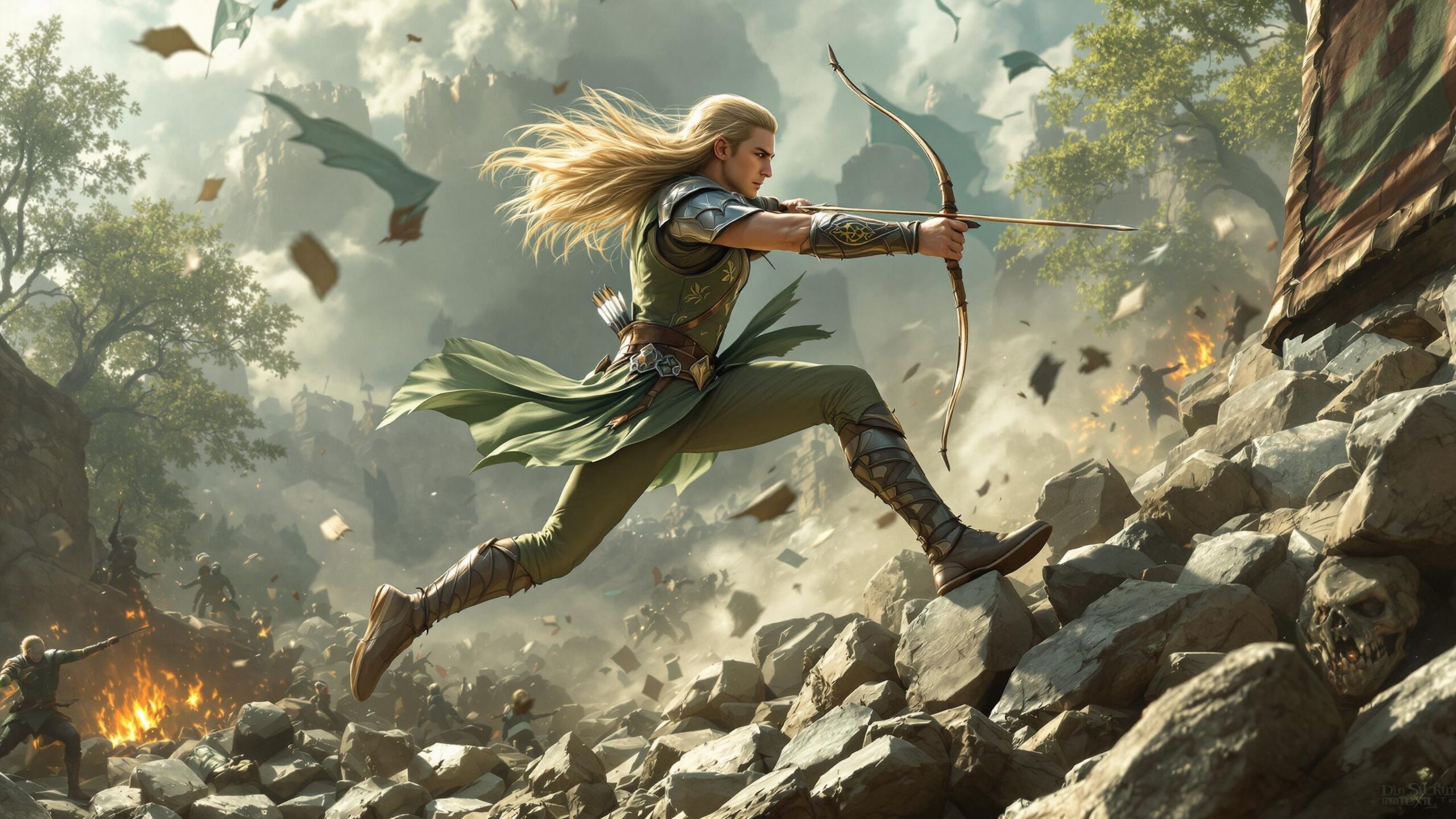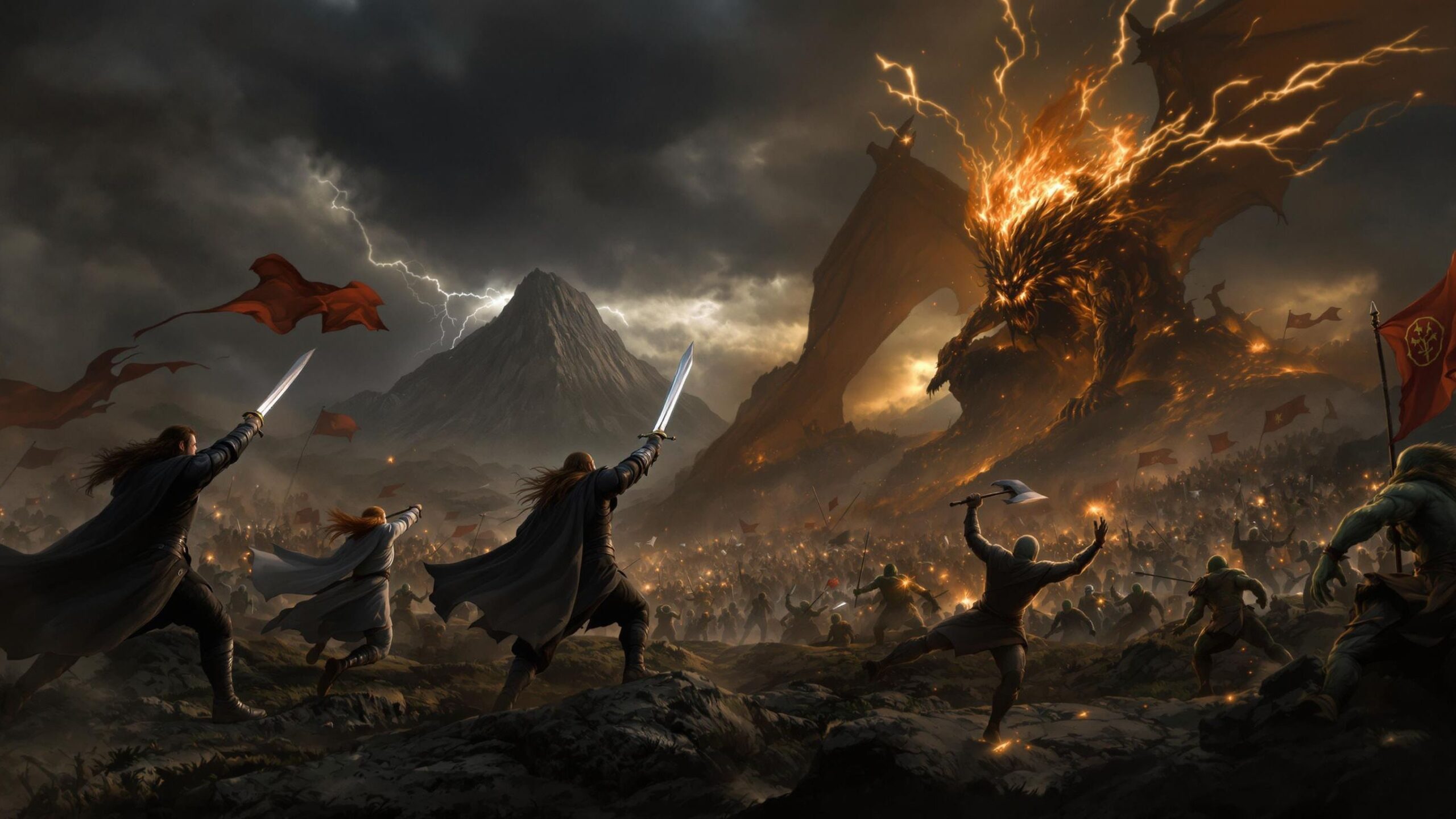Aragorn, son of Arathorn, heir to Isildur, and the man who would become king, is one of the most revered characters in Middle earth. But before his crown and glory, he was a Ranger of the North—known as Strider, a wanderer with a hood, a sword, and a heart stronger than steel. Trained in the wilds, unmatched in tracking and survival, and driven by honor and quiet strength, Aragorn wasn’t just any ranger—he was the Ranger. This list highlights the ten most defining moments where Aragorn proved why he’s the greatest Ranger in Middle earth, from stealthy rescues to valiant battles and impossible journeys.
#10: Tracking the Uruk-hai Across Rohan
After the Fellowship was broken and Merry and Pippin were captured by Saruman’s Uruk-hai, Aragorn wasted no time. With Legolas and Gimli at his side, he launched into an exhausting pursuit across the plains of Rohan. This wasn’t just running after a trail—it was a relentless, skilled hunt through harsh terrain with little rest or food. Aragorn’s ability to read the smallest details—burnt grass, broken branches, discarded gear—transformed the landscape into a map only he could read. His legendary line, “Not idly do the leaves of Lorien fall,” speaks volumes to his perception and reverence for detail. He wasn’t simply chasing; he was calculating every move of the enemy. This journey covered over 45 leagues in just four days—an incredible feat for any man, let alone while tracking stealthy foes who left minimal clues behind. It also required negotiating the political tensions of Rohan, where he had to earn the respect of Éomer and the Riders, despite their mistrust. The pursuit of the Uruk-hai is a prime example of Aragorn’s ranger roots in action—his survival skills, knowledge of enemy tactics, and refusal to give up on his friends. Even without a crown or title, Aragorn led with purpose and expertise, earning admiration not only from his allies but from enemies who realized they were being hunted by someone far more dangerous than they expected.
#9: Leading the Hobbits through the Wild
In The Fellowship of the Ring, when the four Hobbits flee the Shire and are nearly overtaken by the Black Riders, it’s Aragorn—known only then as Strider—who steps out of the shadows of Bree to lead them. While the Hobbits were naive and terrified, Aragorn guided them through dense forests, marshes, and forgotten trails, all while evading the deadly Ringwraiths. He built fires with smokeless wood, led them off-road to avoid traps, and taught them how to travel in silence. His deep knowledge of the wild saved their lives more than once. Particularly in the flight to Weathertop, Aragorn showed just how attuned he was to the land, predicting enemy movements and setting up defenses to buy precious time. When the Ringwraiths did strike, Aragorn didn’t hesitate—he fought them off with torch and sword, alone, holding back beings that paralyze most with fear. This wasn’t just about bravery—it was about preparedness, instinct, and a fierce commitment to protect those under his care. As a ranger, he never sought glory; he simply did what had to be done to keep others alive. The Hobbits had no idea they were being guarded by the future king, and that’s part of what makes Aragorn’s time with them so powerful. He remained humble, mysterious, and vigilant—the quintessential ranger in both form and spirit.
#8: Healing Frodo after Weathertop
After the terrifying confrontation with the Ringwraiths on Weathertop, Frodo is stabbed with a Morgul blade—a wound that could have turned fatal and transformed him into a wraith himself. With little time and no Elven healers nearby, it was Aragorn who took control. Drawing from ancient herbal knowledge passed down among the Rangers and the Elves, he sought out athelas, also known as kingsfoil—a healing plant most wouldn’t even recognize. Using it to ease Frodo’s pain and slow the spread of the poison, Aragorn kept Frodo alive long enough to get him to Rivendell. This moment isn’t as flashy as a sword fight, but it’s one of Aragorn’s most telling displays of his ranger talents. Healing, like tracking, requires attention, calm under pressure, and deep knowledge of the natural world. His ability to find athelas in the wild speaks to his years of experience living off the land. But more importantly, it shows Aragorn’s gentleness—his refusal to give up even when all seems lost. Frodo’s survival hinged on this moment. In Middle earth, where magic and might often overshadow the subtle power of healing, Aragorn reminded us that a true ranger protects life just as fiercely as he fights enemies.
#7: Entering the Paths of the Dead
While many feared the Paths of the Dead—an ancient, haunted route beneath the mountains—it was Aragorn who stepped into that darkness without hesitation. Why? Because he knew the stakes. With Sauron’s armies gathering and Gondor on the brink of ruin, Aragorn took a desperate chance: to summon the Dead Men of Dunharrow, cursed to linger until they fulfilled their ancient oaths. Most wouldn’t dare set foot in such a place. The air was heavy with death, and the very walls whispered doom. But Aragorn’s resolve never wavered. With Andúril reforged, he strode into the mountain, guided by destiny and the unshakable authority of a true king—and yet, it was the soul of a ranger that led him through. His connection to old legends, his understanding of oaths and ancient curses, and his sheer force of will allow him to command the allegiance of the dead. This act wasn’t just a military gamble—it was the culmination of all his years as a ranger, embracing forgotten paths, confronting fear, and wielding quiet power. No other character could have walked that path and returned alive, let alone with an army at their back. It was proof that Aragorn wasn’t just a wanderer—he was a force the darkness itself couldn’t deny.
#6: Surviving Alone in the Wild for Years
Long before he joined the Fellowship or even met Gandalf, Aragorn spent years wandering the wilds of Middle-earth in near-total solitude. As a member of the Dúnedain Rangers of the North, he patrolled vast stretches of wilderness, from the desolate lands near Angmar to the forests surrounding the Shire. Few realize just how important his silent, unseen service was—Aragorn was the invisible shield that protected regions from orc incursions, bandits, and worse. These weren’t heroic quests with songs and glory; these were cold nights, quiet kills, and long years without companionship. He lived off the land, tracked enemies for weeks, and often went without thanks or recognition. He adopted many identities—Thorongil among the men of Gondor and Rohan, Estel in Rivendell—but always returned to the role of the ranger. These years forged him into the man who could lead kings and battle Nazgûl. He wasn’t waiting to be crowned; he was earning it every day in silence. What made Aragorn unique was that he embraced this life, not for reward, but because he knew it needed to be done. It takes a special kind of strength to live in obscurity, constantly giving without taking, and Aragorn embodied that. This era of his life often gets overshadowed by the War of the Ring, but it’s arguably where his legend was truly born—quietly, in the forgotten corners of Middle-earth.
#5: Confronting the Mouth of Sauron
Outside the Black Gate of Mordor, in one of the most chilling scenes in The Return of the King, Aragorn stands face-to-face with the Mouth of Sauron, a dark emissary radiating malice and mockery. The Mouth taunts the gathered leaders, producing Frodo’s mithril shirt as “proof” of his torture and death. The tension is unbearable—but Aragorn does not flinch. While others reel in horror and grief, Aragorn steps forward and with cold fury beheads the Mouth of Sauron without a word. The act is swift, final, and shockingly fearless. It’s more than just a decapitation—it’s a declaration that fear would not be entertained, not for one moment. This moment shows the ranger at his most dangerous: calm, deliberate, and decisive. He recognized a psychological game and shut it down in a single stroke. What’s more impressive is that Aragorn didn’t act out of rashness—he knew the mission wasn’t over, and yet he maintained complete composure. In this instant, he became not just a warrior or king, but a living symbol of defiance. It’s the kind of calculated bravery only a seasoned ranger could deliver—one who has lived through darkness and refuses to be intimidated by it.
#4: Refusing the Ring at Amon Hen
After the fall of Boromir and the breaking of the Fellowship, Aragorn is faced with Frodo, who stands on the edge of decision with the One Ring in his hand. Temptation is thick in the air—the Ring has already claimed one noble man. But not Aragorn. He approaches Frodo slowly, speaking with calm reverence, and when Frodo flinches, fearing yet another betrayal, Aragorn steps back. Then comes the powerful moment: Aragorn kneels, closes Frodo’s hand around the Ring, and says, “I would have gone with you to the end… into the very fires of Mordor.” This scene is among the most emotional in the entire trilogy, and it reveals just how deeply Aragorn understands the weight of destiny and the burden Frodo bears. Any lesser man might have grasped at the Ring. But Aragorn’s self-control, forged through decades of hardship and humility, defines him. He doesn’t crave power—he accepts responsibility. That is the ranger’s creed: to do what must be done, even when no one sees, even when it tears you apart. Aragorn proved in that moment that his strength lay not in physical might, but in restraint, wisdom, and compassion. His refusal of the Ring is not just a noble act—it’s the ultimate ranger act, choosing the harder road without hesitation.
#3: Battling the Nazgûl at Weathertop
Before the Hobbits truly understood who Strider was, they saw him do the unthinkable—stand-alone against the Nazgûl. When the Ringwraiths attacked their camp on Weathertop, cloaked in black and driven by a chilling aura of fear, Aragorn didn’t wait for backup or divine intervention. He lit torches, brandished his sword, and threw himself into the fray, driving off the Nine with a mix of fire, steel, and sheer force of will. It’s easy to forget how terrifying the Nazgûl are: immortal, undead, empowered by Sauron, and almost impossible to kill. Aragorn wasn’t just protecting four terrified Hobbits—he was pushing back the darkness itself. What makes this even more impressive is that he didn’t walk away unscathed; he was shaken but not broken. His actions allowed Frodo to survive and bought them all critical time. This moment marked the first time the Hobbits—and audiences—truly saw what the ranger could do. It was raw courage born not from recklessness but from endless experience. For a man without magical aid or legendary weapons (at that point), Aragorn’s ability to face down ancient evil with only a torch and resolve solidifies his place as the ultimate ranger.
#2: Revealing Himself in the Halls of Rohan
When Gandalf, Aragorn, Legolas, and Gimli arrive in Rohan, they’re strangers in a kingdom under siege by Saruman’s corruption. As they approach King Théoden’s court, Aragorn shows tact and humility. He allows Gandalf to lead, hides his royal heritage, and engages respectfully with Éowyn and Éomer—even when challenged. But it’s in the heated exchange with Gríma Wormtongue where Aragorn’s ranger instincts flare. He sees through the manipulation, steps forward, and reveals both his lineage and authority—not by shouting or demanding, but with a calm intensity that commands the room. Later, when he rides into battle beside Théoden at Helm’s Deep, Aragorn becomes the morale and muscle that keeps the defense alive. He moves like a ranger in every moment: assessing terrain, encouraging the young soldiers, and delivering speeches that stir the heart. His humility and leadership during the darkest moments in Rohan’s history transformed him from an outsider into a trusted ally. And he did it not by brandishing his title, but by acting as he always had—as a protector of the people.
#1: Leading the Charge at the Black Gate
The ultimate ranger moment came not in the shadows, but in the full light of day—when Aragorn, against overwhelming odds, led a hopeless charge against the gates of Mordor. This wasn’t a tactical strike. It was a distraction, a sacrifice, a bold gambit to give Frodo one last chance to destroy the Ring. With only a few thousand men against Sauron’s entire army, Aragorn didn’t show fear. As the Black Gate opened and legions poured forth, Aragorn turned to his friends and simply said, “For Frodo,” before sprinting alone into the jaws of doom. The image of a ranger—battle-scarred, resolute, and utterly fearless—charging into death defines everything Aragorn ever was. He never fought for glory or power. He fought because someone had to. That’s the ranger spirit. In that final act, he gave the free peoples of Middle-earth something far more powerful than an army—he gave them hope. And that’s why Aragorn, more than any other, will always be the greatest Ranger in Middle earth.




